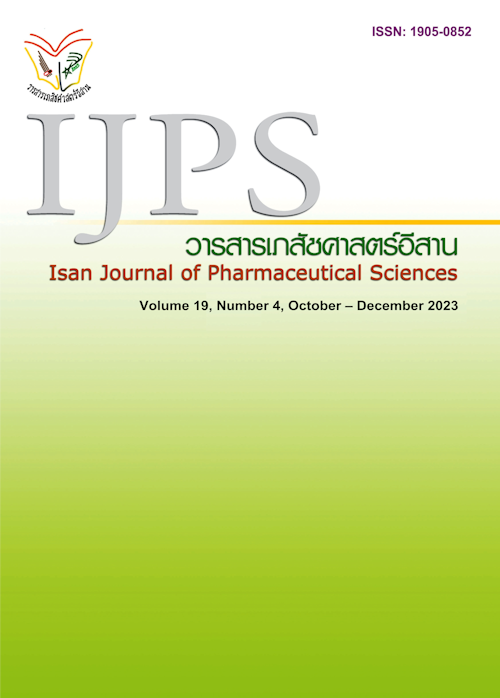The Associated Factors for Prescribing Errors and Drug Related Problems in Stroke Outpatients, the Secondary Care Chiang Kham Hospital Phayao Province
Main Article Content
Abstract
Prescribing errors and drug related problems are important causes affecting drug safety in stroke patients who are typically old with complications, comorbidities and long-term drug therapy. This study aims to explore contributing factors for prescribing errors and drug related problems in outpatients with stroke at Chiang Kham Hospital, the secondary care hospital with 231 beds in Phayao Province. Methods: This analytical cross-sectional study used 3,079 stroke outpatient prescriptions that were retrospectively retrieved between 2019 October 1 and 2020 September 30, together with hospital occurrence incident data. The analysis used Multilevel, mixed model, and logistic regression to perform the exploratory model with significant level at 0.05. Results: Majority patients are older than 60 years old (83.3%) and remain in universal health coverage up to 91.7%. Three significant factors for prescribing errors and drug related problems were revealed. Comprising (1) ischemic heart diseases, pulmonary heart disease and disease of pulmonary circulation and other forms of heart diseases (I20-28, I30-52) (OR=7.2, 95% CI=2.1-24.4, P<0.001), (2) congenital malformations, deformations and chromosomal abnormalities (Q00-99) (OR=18.0, 95% CI=1.4-223.4, P=0.02) and (3) diseases of the digestive system (K00-93) (OR=6.8, 95% CI=1.3-36.2, P=0.02), after nested within individual hospital patient numbers because one patient may take multiple prescriptions (1,057 patients with 3,079 prescriptions) and adjusted for sex, patient age-group, medical benefit scheme, working time and prescriber group. Conclusion: Heart disease, congenital abnormalities, and diseases of the digestive system were all associated with prescribing errors and drug related problems. Those who use medication with concern. The analysis of annual medication use data and hospital incident reporting for safety prescribing monitoring strategy should be considered for hospital risk management.
Article Details

This work is licensed under a Creative Commons Attribution-NonCommercial-NoDerivatives 4.0 International License.
In the case that some parts are used by others The author must Confirm that obtaining permission to use some of the original authors. And must attach evidence That the permission has been included
References
Bird S. Medication errors - warfarin. Aust Fam Physician [serial online] 2003 Dec [cited 2022 Oct 3];32(12). Available from: https://search.informit.org/doi/10.3316/informit.375125645174237
Bureau of Policy and Strategy. ICD-10-TM: International statistical classification of diseases and related health problems, Thai modification. Nonthaburi: Ministry of Public Health; 2009.
Celin AT, Seuma J, Ramesh A. Assessment of drug related problems in stroke patients admitted to a South Indian tertiary care teaching hospital. Indian Journal of Pharmacy Practice 2012;5(4):28–33.
Chiang Kham Hospital Data Center. Annual report of hospital occurrence incident report. Chiang Kham: Chiang Kham Hospital; 2020.
Christensen H, Glipstrup E, Høst N, Nørbæk J, Zielke S. Complications after stroke. In: Norrving B, editor. Oxford textbook of stroke and cerebrovascular disease [Online]. online ed. Oxford: Oxford University Press; 2014 [cited 2022 Oct 3]. Available from: https://doi.org/10.1093/med/9780199641208.003.0018
Classen DC, Jaser L, Budnitz DS. Adverse drug events among hospitalized medicare patients: epidemiology and national estimates from a new approach to surveillance. Jt Comm J Qual Patient Saf 2010;36(1): 12–21.
Dean B, Schachter M, Vincent C, Barber N. Causes of prescribing errors in hospital inpatients: a prospective study. Lancet 2002;359(9315):1373–8.
Doungthipsirikul S, Wachiradilok P, Sirisamutr T. The situation of emergency storke medical services and the literature review of improving the quality of stroke emergency operations [Online]. Nonthaburi: National Institute for Emergency Medicine; 2022 [cited 2022 Nov 4]. Available from: https://www.niems.go.th/1/UploadAttachFile/2022/Ebook/415818_20220624102116.pdf
Fanikos J, Stapinski C, Koo S, Kucher N, Tsilimingras K, GoldhaberSZ. Medication errors associated with anticoagulant therapy in the hospital. Am J Cardiol 2004;94(4):532–5.
Fijn R, Van Den Bemt PM, Chow M, De Blaey CJ, De Jong-Van den Berg LT, Brouwers JR. Hospital prescribing errors: epidemiological assessment of predictors. Br J Clin Pharmacol 2002;53(3):326–31.
Grissinger MC, Hicks RW, Keroack MA, Marella WM, Vaida AJ. Harmful medication errors involving unfractionated and low-molecular-weight heparin in three patient safety reporting programs. Jt Comm J Qual Patient Saf 2010;36(5):195–202.
Healthcare Accreditation Institute. NRLS: National Reporting and Learning System. Common clinical risk incident: medication and blood safety [Online]. 2018 [cited 2022 Feb 3]. Available from http://www.bph.moph.go.th/wp-content/uploads/tqm/NRLS/risk-NRLS.pdf
Henriksen JN, Nielsen LP, Hellebek A,Poulsen BK. Medication errors involving anticoagulants: data from the Danish patient safety database. Pharmacol Res Perspect 2017;5(3):1–8.
Kaur H, Prakash A, Medhi B. Drug therapy in stroke: from preclinical to clinical studies. Pharmacology 2013; 92:324–34.
Kleindorfer DO, Towfighi A, Chaturvedi S, Cockroft KM, Gutierrez J, Lombardi-Hill D, et al. 2021 Guideline for the prevention of stroke in patients with stroke and transient ischemic attack; a guideline from the American Heart Association/American Stroke Association. Stroke 2021;52(7):e364–467.
Lavan AH, Gallagher PF, O’Mahony D. Methods to reduce prescribing errors in elderly patients with multimorbidity. Clin Interv Aging 2016;11:857–66.
Lee JL. Prescribing errors in pediatric outpatient department at a tertiary care hospital in Malaysia. Int J Clin Pharm 2020;42(2):604–9.
Michaels AD, Spinler SA, Leeper B, Ohman EM, Alexander KP, Newby LK, et al. Medication errors in acute cardiovascular and stroke patients: A scientific statement from the american heart association. Circulation 2010;121:1664–82.
National Coordinating Council for Medication Error Report and Prevention (NCC MERP). NCC MERP taxonomy of medication errors [Online]. 2001 [cited 2022 Feb 3]. Available from: https://www.nccmerp.org/sites/default/files/taxonomy2001-07-31.pdf
Rozich JD, Harden CR, Resar RK. Adverse drug event trigger tool: a practical methodology for measuring medication related harm. Qual saf Health Care 2003;12(3):194-200.
Sausukpaiboon P. Medication errors reported by the computer program developed in a large hospital. TJPP 2012;4(1):3–16.
Zaidenstein R, Eyal S, Efrati S, Akivison L, Michowitz MK, Nagornov V, et al. Adverse drug events in hospitalized patients treated with cardiovascular drugs and anticoagulants. Pharmacoepidemiol Drug Saf 2002;11(3):235–8.


